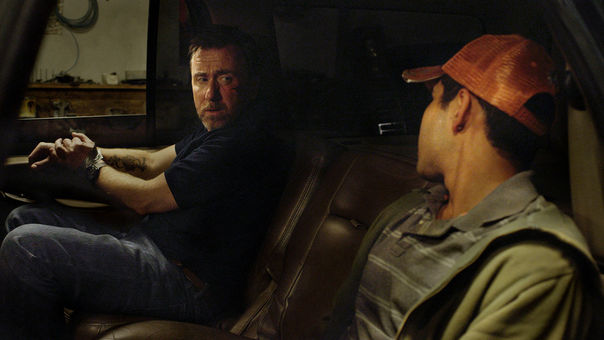FICG2015: Gabriel Ripstein's 600 Millas (600 Miles)
By Jaqueline Avila

A young American goes languidly into a store, walks around, heads for the weapons section. His Mexican friend waits for him in a pickup. He asks about prices and models in a doubtful and at times heated tone of voice. He gets helpful answers to his questions; it seems that selling a pistol is as simple as selling a TV set, if not even more so. Just fill out a form and you're the proud owner of a firearm. There is only one restriction in this market: military weapons are not for sale. Showing how incredibly simple buying weapons can be in the United States is the first narrative anchor for the Mexican Gabriel Ripstein's debut feature, 600 Millas. While the first sequences of the film challenges this phenomenon and can be read as a criticism of the rampant nature of this business in the United States, which allows for the outfitting of criminal groups in Mexico with weapons, this theme is, in itself, a hat with which Ripstein covers his film's head: the clash of two characters with contrasting ways of life whose identities unfold in a context of throbbing violence. Ripstein's characters are well differentiated at the beginning of this film, but it is the development that deconstructs them, showing, perhaps, a twin track for the presentation and development of roles: "the false" reveals "the intimate" of the young Mexican Arnulfo (Krystian Ferrer) who through his "gringo" partner Carson (Harrison Thomas) aims to bring weapons purchased legally in Arizona to northern Mexico for the family business of drug smuggling, and of Hank (Tim Roth), the police officer who will become involved with the Mexican after being—impulsively—kidnapped by him. Arnulfo, who apparently went through puberty in the world of drug trafficking, whose soft facial features show that his virile tone of voice is simulated when he argues with Carson, overexerts himself to master his reality, to which he has to belong while feeling unconnected to it; a brief scene in which, after lining his eyes, Arnulfo looks at himself in the mirror and confronts himself again and again with a "who do you think you are, faggot?"—very much in the style of the You talkin' to me? of the likewise troubled Travis in Martin Scorsese's Taxi Driver —perhaps making the futility of his efforts to belong to the Mexican criminal world even clearer. The sobriety of the formality expressed in clean open shots in solid colors, in dispensing with music (only incidental music scores), fixed cameras in front of which the action is carried out in a quasi-documentary style, not to say intimate, or the shots that are usually heard offstage, and the theme of Ripstein's film is reminiscent of Amat Escalante's Heli, with which it also has some affinity when the violence factor is introduced; both provide brief and strident moments that compete with the story's parsimony, giving it intensity and a change of pace. Gabriel Ripstein's observation of the phenomenon of the sale of weapons in the United States to be then smuggled into Mexico, as well as of the identity of the characters that serve as "case studies" that reveal it, is clever: he encapsulates the tabloid substratum of a story full of weapons and drugs in two or three scenes with shootings. Although the motivations of his characters are not immune to being heavily contradictory and even inconsistent, all things considered, 600 Millas, with its non-conclusive but obviously sarcastic and cynical ending, is a thriller that tries to address the complexity of the phenomenon it is based on with a nuanced portrait of a reality that, unfortunately, is never that blurred.

